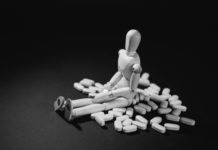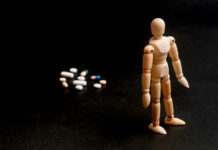The Case Against Antipsychotics
This review of the scientific literature, stretching across six decades, makes the case that antipsychotics, over the long-term, do more harm than good. The drugs lower recovery rates and worsen functional outcomes over longer periods of time.
The Reckoning in Psychiatry Over Protracted Antidepressant Withdrawal
Medically-induced harm—affecting tens of millions of people worldwide—has taken the field decades to take seriously.
Neuroleptic Drugs And Mortality
In November of last year, Schizophrenia Bulletin published a research study that, on the face of it, would seem to upset the notion that neuroleptic drugs are toxic and that their use markedly reduces life expectancy. There are, however, some problems with the study that need to be considered.
Always a Mystery: Why do Drugs Come and Go?
I’ve been teaching a course on substance abuse for about 30 years now. In this course, I cover a new drug class each week and always review the history of the drug. All of the drugs of abuse, cocaine, alcohol, marijuana, opiates are not new on the human scene. They date back to the Sumerians and the Greeks. The question for me is what accounts for epidemics? I have come to believe that epidemics are supplier driven rather than a function of consumer demand. For the current opiate epidemic, the suppliers were the pharmaceutical houses.
The FDA Is Hiding Reports Linking Psych Drugs to Homicides
In my wildest dreams, I could never have imagined being drawn into a story of intrigue involving my own government’s efforts to hide, from the public, reports of psychiatric drugs associated with cases of murder, including homicides committed by youth on the drugs. But that is precisely the intrigue I now find myself enmeshed in.
3 Facts All Parents Should Know About ADHD Stimulant Drugs
Medicating children for a host of mental disorders has become very popular in some parts of the USA. More than 8 million kids from 6 months to 17 years of age are on pharmaceutical drugs in this wonderful country. We lead the world in drugging youth for behavioral, cognitive and attention issues. We are once again #1. But I would like to share with parents as well as adults working with children a few not so readily available facts related to medicating kids for behavior issues.
Benzodiazepines: Miracle Drugs?
The first benzodiazepine – chlordiazepoxide – became available, from Hoffman-La Roche, in 1960. Benzodiazepines largely replaced the earlier barbiturates, which had received a great deal of negative publicity because of their much-publicized role in lethal overdoses, both accidental and intentional. Initially, there was a good measure of skepticism among the general public with regards to benzos, and indeed, with regards to psychotropic drugs generally. The dominant philosophy in those days was that transient, drug-induced states of consciousness were not only ineffective in addressing human problems, but were also dangerous. But pharma-psychiatry systematically, deliberately, and self-servingly undermined this skepticism.
Video: More Harm than Good Conference on Psychiatric Drugs
On September 18th the one day "More Harm than Good Conference" brought together many of the leaders of the critical psychiatry movement. While the event has passed, the video and slides from the conference have been made available on the council for evidence-based psychiatry website.
The Inherent Unreliability of the ADHD Label
I imagine that everybody on this side of the issue knows by now that the eminent psychiatrist Jeffrey Lieberman, MD, Chief Psychiatrist at Columbia, and past President of the APA, called Robert Whitaker "a menace to society." The grounds for Dr. Lieberman's vituperation were that Robert had dared to challenge some of psychiatry's most sacred tenets! But in all the furor, it was largely ignored that in the same interview Dr. Lieberman had said something else that warrants additional discussion.
The Evidence-Based Mind of Psychiatry on Display
The writings of Pies and his colleagues, I believe, provide a compelling case study of cognitive dissonance. Cognitive dissonance arises when people are presented with information that creates conflicted psychological states, challenging some belief they hold dear, and people typically resolve dissonant states by sifting through information in ways that protect their self-esteem and their financial interests. It is easy to see that process operating here.
Psychiatry’s Thalidomide Moment
The authors of Study 329 began recruiting adolescents for a comparative study of Paxil, imipramine and placebo in 1994 and finished their investigations in 1997. They dropped a large number of their original cohort, so the randomness element in the study must be open to question. Late in 1998, SmithKline Beecham, the marketers of Paxil, acknowledged in an internal document that the study had shown that Paxil didn’t work for adolescents in terms of the two primary and six secondary outcomes they had established at the start of the study. In a nutshell, Study 329 was negative for efficacy and positive for harm, contrary to their succinct upbeat conclusion.
The Spurious Chemical Imbalance Theory is Still Alive and Well
The promotion of the chemical imbalance theory did occur, and continues to occur, and is a most shameful chapter in psychiatry's history. It is arguably one of the most destructive, far-reaching, and profitable hoaxes in history. I could not begin to estimate the number of clients I've talked to over the years who told me that their psychiatrists had told them they had a chemical imbalance in their brains, and that they needed to take the pills for life to correct this imbalance. Even today, I regularly receive emails from readers contesting the assertions in my posts and telling me in no uncertain terms that they have chemical imbalances in their brains that cause their problems.
Chemicals Have Consequences: Antidepressants, Pregnancy, and the New York Times
Depressed pregnant women need good care. They should not be made to feel guilty for the choices they make concerning their depression or lectured to by those who don’t understand the area or lack compassion for them. In that sense, Andrew Solomon does the public a service by turning his attention and writing talents to the topic of depression and pregnancy this week in the New York Times. However, a crucial part of providing good care to depressed pregnant women is to give them accurate information on the topic. In this sense, Andrew Solomon falls short.
Summary of Recent Antidepressant Meta-Analyses
On his own website, clinical psychologist Kenneth Pope has summarized 60 meta-analyses of antidepressants published between 2013-2015. The studies contain information on antidepressants “uses,...
Disability and Mood Disorders in the Age of Prozac
When I was researching Anatomy of an Epidemic and sought to track the number of people receiving a disability payment between 1987 and 2007 due to “mental illness,” I was frustrated by the lack of diagnostic clarity in the data. The Social Security Administration would list, in its annual reports on the Supplemental Security Income and Social Security Disability Insurance (SSDI) programs, the number of people receiving payment for “mental disorders,” which in turn was broken down into just two subcategories: “retardation,” and “other mental disorders.” Unfortunately, the “other mental disorders,” which was the category for those with psychiatric disorders, was not broken down into its diagnostic parts.
Me, Allen Frances, and Climbing Out of a Pigeonhole
Four weeks ago, after I wrote a blog about a study that concluded there was no good evidence that antipsychotics improved long-term outcomes for people diagnosed with schizophrenia, I was cc’d on an email that had been sent to a number of “thought leaders” about what I had written. At least as I read the email, it put me into the usual pigeonhole for critics of psychiatric drugs: I apparently was globally “against” medications, and I had displayed a type of simplistic “categorical” thinking. All of this led to my having an email exchange with Allen Frances, and his laying out, in his opinion, the considerable "collateral damage" my writings had done.
Depression: It’s Not Your Serotonin
What if I told you that, in 6 decades of research, the serotonin (or norepinephrine, or dopamine) theory of depression and anxiety - the claim that “Depression is a serious medical condition that may be due to a chemical imbalance, and Zoloft works to correct this imbalance” - has not achieved scientific credibility? You’d want some supporting arguments for this shocking claim. So, here you go:
Researching the Link Between SSRIs and Violence
In 2010, my 25-year old son was prescribed Prozac for depression. After a psychiatrist doubled his dose, my son became acutely psychotic and had to be admitted to the hospital. Over the next twelve months, during which time he was treated with antidepressants and neuroleptics, my son had five further psychotic experiences. I thought it might be that my son was having difficulty metabolising the drugs.
Largest Survey of Antidepressants Finds High Rates of Adverse Emotional and Interpersonal Effects
I thought I would make a small contribution to the discussion about how coverage of the recent airline tragedy focuses so much on the supposed ‘mental illness’ of the pilot and not so much on the possible role of antidepressants. Of course we will never know the answer to these questions but it is important, I think, to combat the simplistic nonsense wheeled out after most such tragedies, the nonsense that says the person had an illness that made them do awful things. So, just to confirm what many recipients of antidepressants, clinicians and researchers have been saying for a long time, here are some findings from our recent New Zealand survey of over 1,800 people taking anti-depressants, which we think is the largest survey to date.
Dr. Pies and Dr. Frances Make a Compelling Case that Their Profession is Doing...
Over the past two months, Ronald Pies and Allen Frances, in response to a post I had written, wrote several blogs that were meant to serve as an “evidence-based” defense of the long-term use of antipsychotics. As I read their pieces, I initially focused on that core argument they were presenting, but second time through, the aha moment arrived for me. Their blogs, when carefully parsed, make a compelling case that their profession, in their use of antipsychotics as a treatment for multiple psychotic disorders, has done great harm, and continues to do so today.
Suicide in the Age of Prozac
During the past twenty years, the American Foundation for Suicide Prevention and American psychiatry have adopted a "medicalized" approach to preventing suicide, claiming that antidepressants are protective against suicide. Yet, the suicide rate in the United States has increased 30% since 2000, a time of rising usage of antidepressants. A review of studies of the effects of mental health treatment and antidepressants on suicide reveals why this medicalized approach has not only failed, but pushed suicide rates higher.
Yesterday I Looked Forward to Taking Psych Drugs
People hassle me for being anti-medication, and I always tell them I am NOT anti-medication; I am pro-fully-informed choice. But people like things black-and-white. They see me as being against medications, and so I'm telling you why medications may have saved my life yesterday, or at least saved me a whole bunch more trouble.
Update: Massachusetts Benzodiazepine Bill Hearing
The hearing for Bill H4062: Informed Consent for Benzodiazepines and Non-benzodiazepine Hypnotics took place on Monday – in the middle of an April snowstorm! The discussion clarified some important points in the legislation and gave survivors an opportunity to tell their stories. I was so proud to be there and witness the courage, camaraderie, resilience, advocacy, and vulnerability of fellow survivors. This legislation is our chance to be heard. As one survivor said, through tears, to the committee, “Do not let my suffering be in vain. I beg you to pass this bill.”
A Tale of Two Studies
With increasing evidence that psychiatric drugs do more harm than good over the long term, the field of psychiatry often seems focused on sifting through the mounds of research data it has collected, eager to at last sit up and cry, here’s a shiny speck of gold! Our drugs do work! One recently published study on withdrawal of antipsychotics tells of long-term benefits. A second tells of long-term harm. Which one is convincing?
The Use of Antipsychotic Medications in Children
Since the mid-1990s antipsychotic medications have been increasingly prescribed for children, adolescents, and adults. The most recent report finds an increase in use for older children from 2006 to 2008. Most of the prescriptions of antipsychotics for children reported by the study were for conditions which had not been approved by the FDA (called off-label use).














